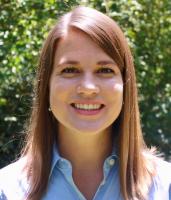 Dr. Amanda Frossard (Assistant Professor, UGA Department of Chemistry) will be presenting a special seminar on Oct 26 at 11 AM in the Skidaway Institute McGowan Library auditorium. .
Dr. Amanda Frossard (Assistant Professor, UGA Department of Chemistry) will be presenting a special seminar on Oct 26 at 11 AM in the Skidaway Institute McGowan Library auditorium. .
Investigating the chemistry of marine aerosol particles and their influence on clouds
The influence of aerosol particles on clouds remains one of the largest uncertainties in accurately predicting the Earth’s energy balance in a changing climate system. The size and chemical composition of aerosol particles affects their radiative properties and ability to grow into cloud droplets, thus influencing the properties and lifetimes of cloud. Recent studies suggest that the presence of surface-active organics (surfactants) in these particles may play a role in cloud droplet growth, but the surfactant properties of aerosol particles are not well-constrained. Although surfactants account for minor fractions of total organic carbon in the ocean, they may also have major impacts on the surface tension of bursting bubbles at the sea surface that drive the production of primary marine aerosol particles (PMA). The focus of our research is on determining the chemical composition and concentration of surfactant in marine aerosol particles and their influence on both ocean bubble bursting and cloud properties. During September and October 2016, PMA were produced from bursting bubbles in seawater using a high capacity generator at two biologically productive and two oligotrophic stations in the western North Atlantic, as part of a cruise on the R/V Endeavor. Surfactants were extracted from paired PMA and seawater samples, and their ionic compositions, total concentrations, and critical micelle concentrations (CMC) were quantified and compared for the four hydrographic stations. The extracted surfactants can also be used in single particle optical trap studies to determine the influence of surfactants on droplet growth.


